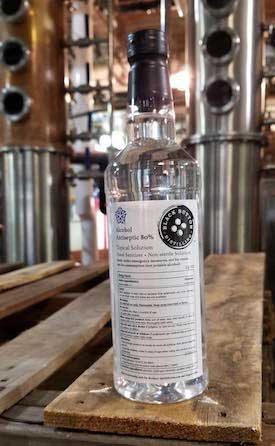WNY Energy supplying ethanol for sanitizer to fight Covid-19
Press Release, Western New York Energy, Orleans Economic Development Agency
MEDINA – Western New York Energy in Medina has adapted its operations to provide distilleries, technology companies, and global personal care corporations in the United States and Canada with ethanol to produce hand sanitizer in response to the coronavirus global pandemic.
“In conjunction with New York’s corn growers, Western New York Energy is committed to assisting distillers and companies of any size to manufacture hand sanitizer in the fight against this devastating pandemic,” said Tim Winters, WNYE President and CEO. “We could not do this without the support of the farmers, our partners for the past 13 years, who are the bedrock of this region.”

Photo courtesy of Black Button Distilling: Some of the WNY Energy ethanol is being used for sanitizer.
The WNY Energy facility is locally owned and can produce up to 150,000 gallons per day of tech-grade ethanol for industrial purposes such as sanitizer production. Winters and 50 employees are supplying some of the country’s largest technology companies and global personal care corporations that have repurposed operations to address the nationwide need for sanitizer, along with distillers across New York, New Jersey, Pennsylvania, Ohio, Massachusetts, and Maine that have halted alcohol production to produce sanitizer for the urgent needs of doctors, hospitals, and at-risk communities.
Distilleries that WNY Energy first supplied at the forefront of the COVID response include: Black Button Distilling and Iron Smoke Distillery in Rochester, Uncle Jumbo’s Vodka in Buffalo, Prohibition Distillery in Roscoe, NY, Clayton Distillery in Clayton, NY and Maine Craft Distillery in Portland, ME. Many of those companies first bottled the sanitizer in 24-ounce glass liquor bottles they had in stock, but are now working to make sanitizer available in larger gallon containers, pails or drums.
“Western New York Energy is a respected industry partner and a critically important, reliable market for our corn growers,” said Colleen Klein, executive director of NY Corn and Soybean Growers Association. “In usual circumstances, our crop is used in the Medina facility to make clean, renewable fuel but these are not usual circumstances. We are facing unprecedented times as a state and nation. We applaud WNYE’s ability and willingness to pivot their business to provide much needed sanitation resources while maintaining the market for our growers during these uncertain times.”
More distilleries across the Northeast, Midwest, and the larger corporations WNYE has begun to supply are ramping up the production of 75-80% alcohol-based hand sanitizers for retail and wholesale.
“As we move forward, you can rest assured that New York farmers are going to show up to do their job – whatever it takes,” Klein said. “We’re happy to have a friend in Western New York Energy who shares this mentality. Whether you’re farm tough, New York City tough, or anywhere in between – we’re all stronger together.”
Western New York Energy opened in 2007 after construction of a $90 million facility in Medina. WNYE is proud to be partnering with New York’s farmers to produce domestic, clean, renewable energy.
On an annual basis WNYE processes approximately 20 million bushels of corn into more than 60 million gallons of fuel-grade biofuel blended with gasoline; 140,000 tons of high-quality dairy distillers grain for the dairy and livestock industries; 1.8 million gallons of feed-grade corn oil sold as a feed product or for further processing into biodiesel; and 100,000 tons of food-grade carbon dioxide.
“Western New York Energy has become one of the most important industries in Orleans County and New York State,” said Jim Whipple, CEO of the Orleans Economic Development Agency. “The economics tied to WNYE not only supports local farmers, but the operation is the largest taxpayer in Orleans County. It is important that products made in New York’s farm communities be given purchasing priority in times like this, as we are often more equipped and adaptive to support the needs of heavily populated urban areas that could be struggling.”







































































